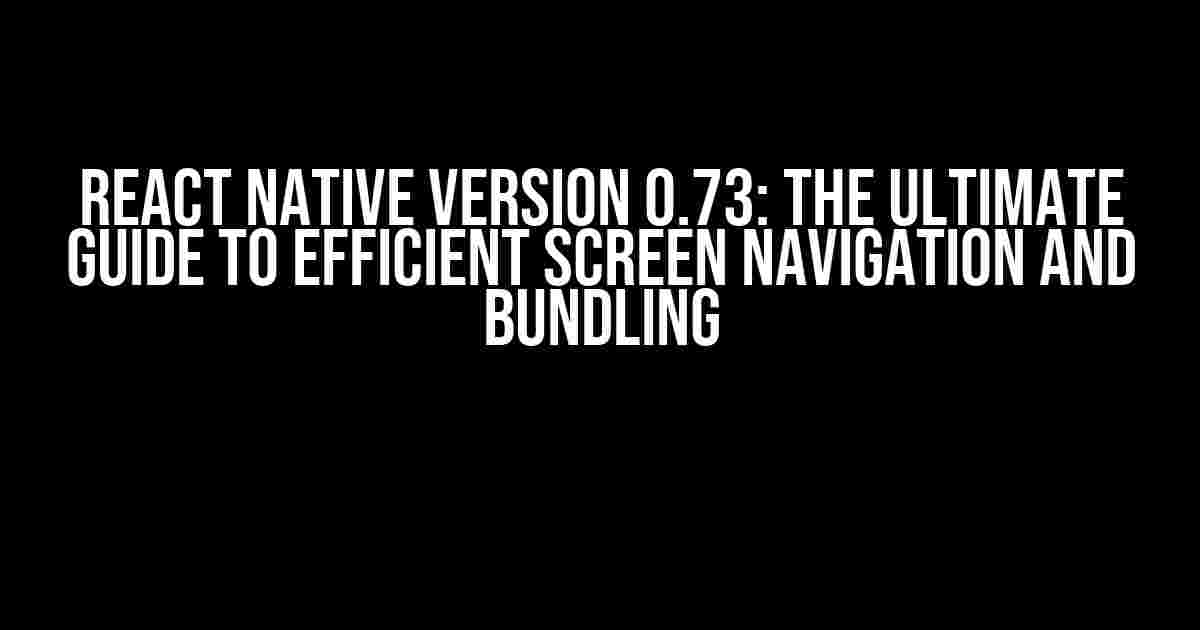Are you frustrated with slow screen navigation in your React Native app? Do you want to optimize your app’s performance and provide a seamless user experience? Look no further! In this article, we’ll dive into the latest React Native version 0.73 and explore the game-changing features that will revolutionize the way you navigate and bundle your app’s screens.
What’s New in React Native Version 0.73?
The latest version of React Native brings several exciting features and improvements that address common pain points in app development. One of the most significant updates is the introduction of automatic bundling on every screen navigation.
Automatic Bundling: What Does It Mean?
In previous React Native versions, bundling was a manual process that required developers to configure and optimize their app’s code splitting. With version 0.73, this process is now automated, ensuring that your app’s code is bundled and loaded efficiently on every screen navigation.
Benefits of Automatic Bundling
The benefits of automatic bundling are numerous:
- Faster App Launch Times: With automatic bundling, your app’s code is optimized and loaded in the background, resulting in faster launch times and improved overall performance.
- Efficient Screen Navigation: Automatic bundling ensures that only the necessary code is loaded on each screen, reducing memory usage and improving navigation performance.
- Simplified Code Management: No more manual code splitting and configuration! Automatic bundling takes care of it all, freeing up your time to focus on more critical app development tasks.
Configuring Automatic Bundling in React Native Version 0.73
So, how do you take advantage of automatic bundling in React Native version 0.73? Follow these simple steps:
- Update to React Native Version 0.73: Ensure you’re running the latest version of React Native by running the following command in your terminal:
- Enable Automatic Bundling: Add the following configuration to your app’s
metro.config.jsfile: - Optimize Your App’s Code Structure: Organize your app’s code into logical modules and components to ensure efficient bundling. Follow best practices for code splitting and lazy loading to get the most out of automatic bundling.
npm install [email protected]
module.exports = {
// ...
bundler: {
enabled: true,
mode: 'automatic',
},
};Tips and Tricks for Efficient Screen Navigation
In addition to automatic bundling, here are some additional tips to optimize your app’s screen navigation:
- Use Lazy Loading: Defer loading non-essential components and modules until they’re actually needed, reducing the initial load time and improving overall performance.
- Implement Code Splitting: Break down your app’s code into smaller chunks, allowing for more efficient loading and caching.
- Optimize Your App’s Routing: Use a routing library like react-navigation to simplify navigation and reduce the complexity of your app’s code.
- Monitor and Analyze Performance: Use tools like the React Native Debugger and iOS/Android profiling tools to identify performance bottlenecks and optimize your app’s code accordingly.
Common Issues and Solutions
As with any new technology, you may encounter some issues when implementing automatic bundling in React Native version 0.73. Here are some common issues and solutions:
| Issue | Solution |
|---|---|
| Bundle size is too large | Optimize your app’s code structure, remove unnecessary dependencies, and use code splitting and lazy loading. |
| Navigating between screens is slow | Ensure you’ve enabled automatic bundling, and optimize your app’s routing and code loading. Use tools like the React Native Debugger to identify performance bottlenecks. |
| Bundle is not being updated | Clear your app’s cache, and ensure you’ve updated to the latest version of React Native. Check your metro.config.js file for configuration issues. |
Conclusion
Remember, efficient screen navigation and bundling are crucial for a successful mobile app. Take advantage of React Native version 0.73’s automatic bundling feature, and watch your app’s performance soar!
Happy coding!
Frequently Asked Question
Get answers to your burning questions about React Native version 0.73’s bundling on every screen navigation!
What’s the deal with React Native 0.73 bundling on every screen navigation?
In React Native 0.73, the core team introduced a new feature called “Bundle splitting” that allows for more efficient code splitting and lazy loading. This means that each screen navigation will create a new bundle, which can lead to faster load times and smaller bundle sizes. However, this change can also cause some confusion and issues for developers who are not prepared for the new behavior.
Why is my app’s bundle size increasing with every screen navigation?
This is because of the new bundle splitting feature in React Native 0.73. Each screen navigation creates a new bundle, which can lead to an increase in overall bundle size. To mitigate this, you can use techniques like code splitting, lazy loading, and optimizing your code to reduce the size of each bundle.
How can I optimize my app’s performance with the new bundle splitting feature?
To optimize your app’s performance, you can use techniques like code splitting, lazy loading, and optimizing your code to reduce the size of each bundle. You can also use tools like the React Native Debugger and the Chrome DevTools to identify performance bottlenecks and optimize your app’s performance.
Will the new bundle splitting feature affect my app’s caching behavior?
Yes, the new bundle splitting feature can affect your app’s caching behavior. Because each screen navigation creates a new bundle, your app’s cache may not work as expected. You may need to update your caching strategy to accommodate the new bundle splitting feature.
How can I disable the bundle splitting feature in React Native 0.73?
You can disable the bundle splitting feature by setting the `enabled` property to `false` in the `bundleSplitting` section of your `react-native.config.js` file. However, keep in mind that disabling this feature may affect your app’s performance and loading times.
Still have questions? Reach out to the React Native community for more help and support!

